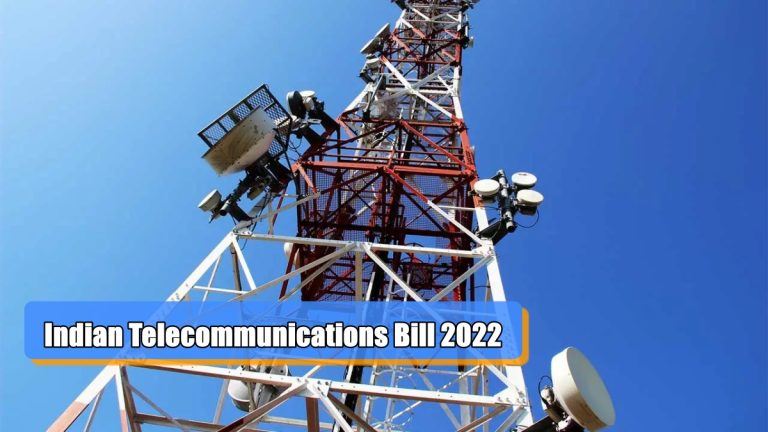The Department of Telecommunications (DoT) published the draught Indian Telecommunication Bill, 2022 in an effort to repeal British-era telecom rules. The proposed Bill proposes to make significant changes to how the telecom sector is controlled, largely by granting the Centre additional authority in key areas.
The Centre intends to consolidate and alter current laws regulating the supply, development, extension, and operation of telecommunication services, telecom networks, and infrastructure, as well as spectrum assignment, through the Indian Telecommunication Bill, 2022. The draught Bill, which was released by the Department of Telecommunications late Wednesday night, combines three separate acts that govern the telecommunications sector: the Indian Telegraph Act of 1885, the Indian Wireless Telegraphy Act of 1933, and the Telegraph Wires, (Unlawful Protection) Act of 1950.

One of the most significant developments is the inclusion of new-age over-the-top communication services such as WhatsApp, Signal, and Telegram in the definition of telecommunications services.
According to the draught law, suppliers of telecommunication services would be subject to the same licencing framework as other telecom operators. For several years, telecom service providers have been seeking a level playing field with OTT apps over communication services such as voice calls, messages, and so on, where operators had to incur high costs of licences and spectrum, while OTT players rode on their infrastructure to offer free services.
The Centre is also considering amending the Telecom Regulatory Authority of India Act (TRAI Act) to weaken the sectoral watchdog’s role as a recommending body. The current TRAI Act requires the telecom department to consult with the regulator before granting a new licence to a service provider. This clause is repealed in the proposed Bill.
It has also deleted the clause that allowed TRAI to obtain information or documents from the government in order to make this recommendation. Furthermore, the revised Bill wants to delete the section that requires the DoT to submit back the suggestion for reconsideration by TRAI if it cannot accept TRAI’s recommendations or requires change.
The Department of Transportation has also recommended that if a telecom business in possession of spectrum declares bankruptcy or insolvency, the allotted spectrum will revert to the Centre’s authority. So far, there has been a lack of clarity in insolvency procedures as to whether the spectrum owned by a defaulting operator belongs to the Centre or if banks may seize possession of it.
The draught Bill also gives the Centre the authority to postpone, convert into equity, wipe off, or award relief to any licensee in extreme circumstances, such as financial difficulty, consumer interest, or sustaining competition.
It also suggests that the Universal Service Obligation Fund (USOF) be replaced with the Telecommunication Development Fund (TDF). The USOF is a pool of money created by the 5% Universal Service Levy levied on all telecom fund operators’ Adjusted Gross Revenue. The USOF has mostly been utilised to improve rural connectivity. The TDF, on the other hand, aims to improve connectivity in disadvantaged urban areas, as well as R&D and talent development.
